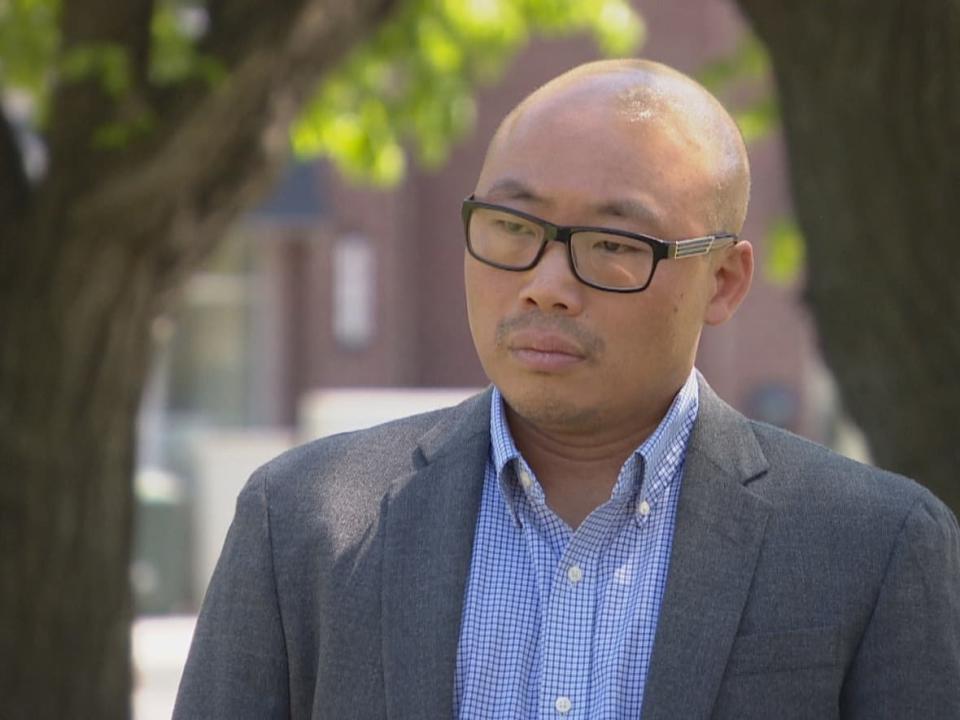No 'clear end in sight' for Saskatchewan's COVID-19 curve, doctor says

While new COVID-19 case numbers are trending downward in Saskatchewan, a Regina doctor says there is no "clear end in sight" for the province.
Saskatchewan has seen a downward trend in the number of new cases being reported each day over the past two weeks, but at the same time the province has recorded the highest rates of COVID-19 cases and deaths of any province in Canada, and is having to transfer some ICU patients with COVID-19 to Ontario.
"It doesn't look as though our curve is going to come down soon," Dr. Alex Wong, an infectious diseases doctor at Regina General Hospital, said Tuesday.
"It doesn't look as though there's a clear end in sight at this point, and more [out-of-province] transfers will be needed, as well as additional staffing."
Wong noted that community transmission in the province is "exceedingly high" and said he is concerned about Saskatchewan's test positivity rate and the latest wastewater studies.
On Monday, the Global Institute for Water Security, which uses sewage samples to predict future COVID-19 trends, reported a dramatic jump in viral load in sewage samples taken from three Saskatchewan cities.
The institute's report showed an increase of 109 per cent in viral RNA in Saskatoon's wastewater sample compared to the week before, an increase of 124 per cent in North Battleford and a 61 per cent increase in Prince Albert.
Samples from all three cities were taken last week and included the Thanksgiving long weekend.
CBC News has asked to see the province's latest COVID modelling data, but the ministry of health said it "will be released shortly" and that media will be notified when it's available.
WATCH | Saskatchewan COVID-19 situation 'beyond dire,' Dr. Wong says
"We just have too much ongoing human interaction which is what allows the virus to spread," Wong said.
"Our test positivity is well over 10 per cent and again our wastewater is not showing any relief at this time and significant increases, perhaps as a result of a Thanksgiving holiday with no restrictions."
The test positivity rate, or the percentage of tests that are coming back positive, is about 13 per cent, as there were 271 new cases reported on Tuesday and 2,092 tests administered.
The test positivity rate has been climbing since the end of July, when it was 3.5 per cent.
Doctors call for more restrictions
Since the summer, doctors and other health-care workers have been calling on the provincial government to do more in the fight against COVID-19.
"The situation is beyond dire at this point and we really need measures that are going to help to bend our curve and move things in the right direction as quickly as possible," Wong said.
Wong said gathering restrictions are needed "immediately, especially for those who are unvaccinated."
"An approach similar to Alberta in terms of limiting indoor gatherings and limiting indoor gatherings extremely harshly for persons who are not vaccinated is the way we're going to, I think, bend our curve a little bit more quickly."
Wong said the province's vaccine mandate needs to be broadened to include people who work with vulnerable populations like children under 12 who are not yet eligible for vaccination.
Dr. Hassan Masri, a Saskatoon-based intensive care physician, said Premier Scott Moe's management of the fourth wave has been "terrible" and "has disregarded science."
"The premier needs to instruct his government to be very clear that vaccine passports and vaccine mandates are here to stay … and needs to make sure that they are being enforced," Masri said.
WATCH| Sask. Premier says province should have moved faster, as 6 ICU patients sent to Ontario:
Moe has admitted that his government could have acted sooner in its response to COVID-19 and apologized to people who are not able to get their medical procedures because of the fourth wave of COVID-19.

 Yahoo Movies
Yahoo Movies 